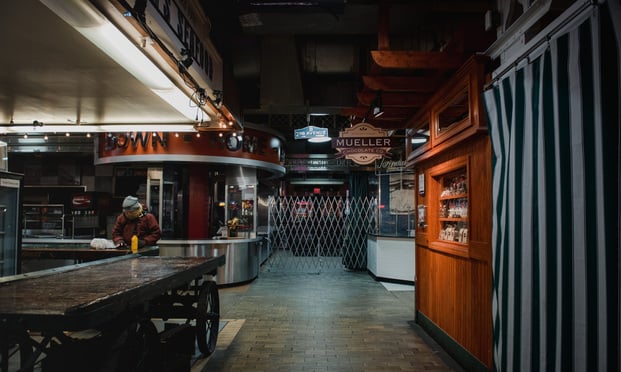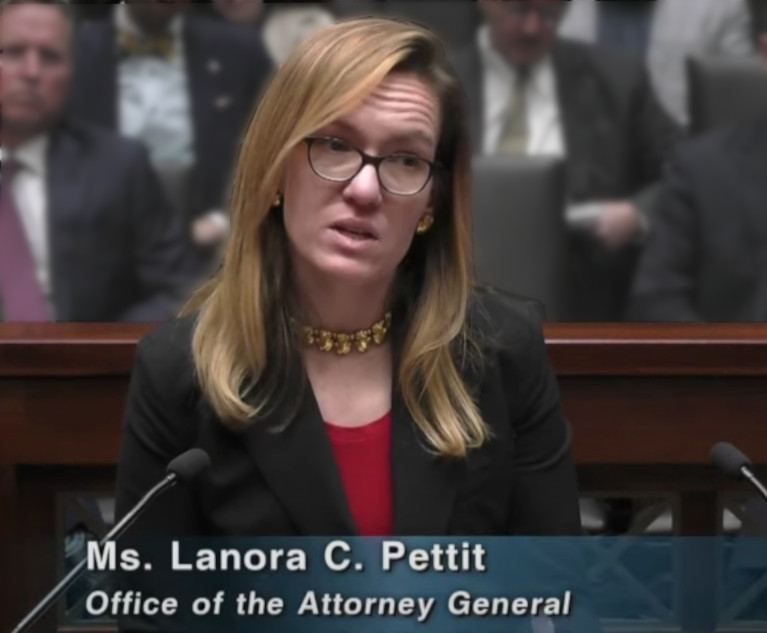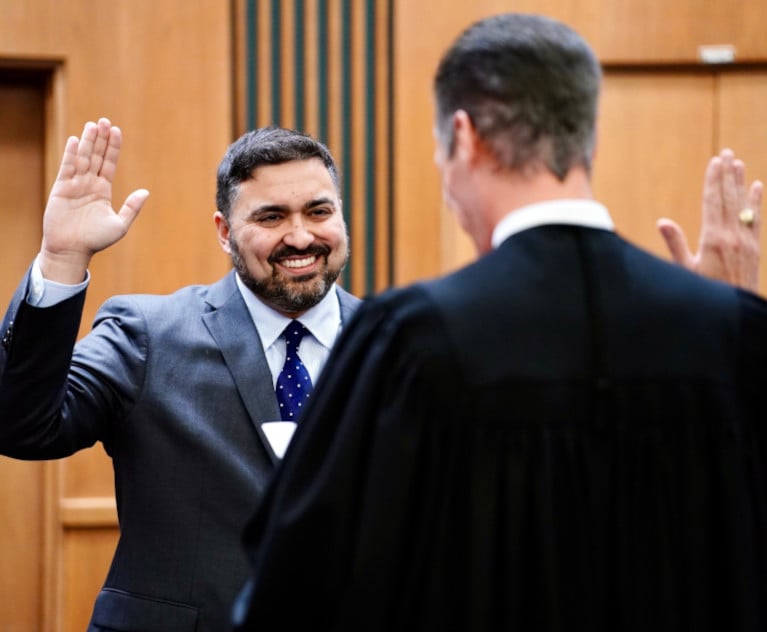SCOTUS Turns Away Businesses' Challenge to Pa. Gov. Wolf's Close-Down Order
The business owners' group argued unsuccessfully that the governor's order was overly broad and based on "hysteria," not reason.
May 06, 2020 at 03:10 PM
5 minute read
The original version of this story was published on The Legal Intelligencer
 The inside of Reading Terminal Market sits nearly empty in Philadelphia on April 15, 2020. Photo: Hannah Yoon/Bloomberg
The inside of Reading Terminal Market sits nearly empty in Philadelphia on April 15, 2020. Photo: Hannah Yoon/Bloomberg
The U.S. Supreme Court has denied efforts by a group of business owners to block Pennsylvania Gov. Tom Wolf from enforcing his order temporarily shutting down all nonessential businesses in the Keystone State in an effort to help stem the spread of COVID-19.
The decision comes on the same day that the business group filed a brief with the high court that rebuked the Wolf administration's bid to end the litigation.
The group—which is led led by a political candidate from Allegheny County named Danny DeVito—filed a brief with the U.S. Supreme Court after Justice Samuel Alito asked parties for additional arguments on whether the case should be taken up.
Responding to the Wolf administration's brief asking the justices to reject the petition challenging the orders, the business owners Wednesday said they presented constitutional questions the high court should consider.
The business owners' group argued unsuccessfully that the governor's order was overly broad and based on "hysteria," not reason.
"Petitioners could very well suffer complete financial ruin and the closure of their businesses and the permanent loss of their property interests if the executive order is not stayed/enjoined right now," the brief, filed by Harrisburg attorney Marc Scaringi, said. "Thus, the injunction is necessary to aid this court in its jurisdiction and its determination of the underlying constitutional claims because petitioners may go out of business and never able to recover in the time it takes this court to conduct a full and comprehensive review of the petition for writ of certiorari."
Businesses in Pennsylvania have been closed since mid-March, after Wolf ordered that all nonessential facilities close in an effort to stem the spread of the highly contagious coronavirus. Governors across the country have issued similar orders, putting a massive strain on the U.S. economy and leading to some protests at capitol buildings across the country.
However, one professor who spoke with The Legal before the Supreme Court officially rejected the case said it remained unlikely that the justices would take up the case.
Ryan Owens, a professor of political science at University of Wisconsin-Madison Law School, said that, to begin with, the Supreme Court tends to focus on cases where there is a lot of legal conflict across the states or federal circuit courts. With Pennsylvania's case being one of the first to have gone through the full state court process, the justices might feel that the issues presented are premature, Owens said.
"The court likes to wait and allow some percolation to go on and to have the issues addressed by multiple courts," Owens said. "Is it possible [that they take up the case]? Absolutely. Is it likely? Not at this point."
Although Alito's request for additional briefing shows the justices are considering the case, according to Owens there was little court watchers could glean from the request.
"A call for a response by a circuit justice is not unusual. I don't think that really gives us any insight," he said. "At minimum it shows the court is not dismissing this out of hand, but it's not much more than that."
Further, Owens said, with the shutdowns being such a hot-button issue lately, the high court would be even less likely to address the matter before the real policy makers get a chance to wade into the issues.
"They're not elected. They're not the institutional actors with the expertise," Owens said. "Why would they want to put themselves out there? … There are others out there fully capable of handling it."
In his request to have the justices reject the case, Wolf contended that the U.S. Supreme Court did not need to handle the issue, in part, because the Pennsylvania Supreme Court had already reviewed the case, and, although three justices joined a dissent, the crux of the dissent's position was that the Commonwealth Court needed to further develop the record. Wolf further argued that the groups' claims amounted to little more than a disagreement about policy, rather than a substantive argument about whether the governor's office had the authority to grant the orders.
However, in the response filed Wednesday, the group said Wolf's order indisputably violated their rights and was an unconstitutional use of police power. They also argued that the governor's process for granting waivers was arbitrary and secretive, and noted that both the General Assembly and the state auditor general are probing the waiver process.
The group further said the lower court never cited any legal authority in finding that Wolf, since he needed to act quickly to stem the spread of COVID, did not violate due process.
"It simply made an observation based upon staggeringly inaccurate projections about COVID-19 and hysterical reports in the media about how COVID-19 would cause mass death," the group said in the brief. "In fact, COVID-19 is a mild flu to the overwhelming majority of people who contract it; it is so mild great numbers of people do not even know they have contracted it; and it only presents risk of death to an infinitesimal number of people. Policy decisions based upon staggeringly inaccurate projections and hysteria are not rationale."
Neither the governor's press office nor Scaringi returned a call seeking comment.
This content has been archived. It is available through our partners, LexisNexis® and Bloomberg Law.
To view this content, please continue to their sites.
Not a Lexis Subscriber?
Subscribe Now
Not a Bloomberg Law Subscriber?
Subscribe Now
NOT FOR REPRINT
© 2025 ALM Global, LLC, All Rights Reserved. Request academic re-use from www.copyright.com. All other uses, submit a request to [email protected]. For more information visit Asset & Logo Licensing.
You Might Like
View All


Trending Stories
- 1Uber Files RICO Suit Against Plaintiff-Side Firms Alleging Fraudulent Injury Claims
- 2The Law Firm Disrupted: Scrutinizing the Elephant More Than the Mouse
- 3Inherent Diminished Value Damages Unavailable to 3rd-Party Claimants, Court Says
- 4Pa. Defense Firm Sued by Client Over Ex-Eagles Player's $43.5M Med Mal Win
- 5Losses Mount at Morris Manning, but Departing Ex-Chair Stays Bullish About His Old Firm's Future
Who Got The Work
J. Brugh Lower of Gibbons has entered an appearance for industrial equipment supplier Devco Corporation in a pending trademark infringement lawsuit. The suit, accusing the defendant of selling knock-off Graco products, was filed Dec. 18 in New Jersey District Court by Rivkin Radler on behalf of Graco Inc. and Graco Minnesota. The case, assigned to U.S. District Judge Zahid N. Quraishi, is 3:24-cv-11294, Graco Inc. et al v. Devco Corporation.
Who Got The Work
Rebecca Maller-Stein and Kent A. Yalowitz of Arnold & Porter Kaye Scholer have entered their appearances for Hanaco Venture Capital and its executives, Lior Prosor and David Frankel, in a pending securities lawsuit. The action, filed on Dec. 24 in New York Southern District Court by Zell, Aron & Co. on behalf of Goldeneye Advisors, accuses the defendants of negligently and fraudulently managing the plaintiff's $1 million investment. The case, assigned to U.S. District Judge Vernon S. Broderick, is 1:24-cv-09918, Goldeneye Advisors, LLC v. Hanaco Venture Capital, Ltd. et al.
Who Got The Work
Attorneys from A&O Shearman has stepped in as defense counsel for Toronto-Dominion Bank and other defendants in a pending securities class action. The suit, filed Dec. 11 in New York Southern District Court by Bleichmar Fonti & Auld, accuses the defendants of concealing the bank's 'pervasive' deficiencies in regards to its compliance with the Bank Secrecy Act and the quality of its anti-money laundering controls. The case, assigned to U.S. District Judge Arun Subramanian, is 1:24-cv-09445, Gonzalez v. The Toronto-Dominion Bank et al.
Who Got The Work
Crown Castle International, a Pennsylvania company providing shared communications infrastructure, has turned to Luke D. Wolf of Gordon Rees Scully Mansukhani to fend off a pending breach-of-contract lawsuit. The court action, filed Nov. 25 in Michigan Eastern District Court by Hooper Hathaway PC on behalf of The Town Residences LLC, accuses Crown Castle of failing to transfer approximately $30,000 in utility payments from T-Mobile in breach of a roof-top lease and assignment agreement. The case, assigned to U.S. District Judge Susan K. Declercq, is 2:24-cv-13131, The Town Residences LLC v. T-Mobile US, Inc. et al.
Who Got The Work
Wilfred P. Coronato and Daniel M. Schwartz of McCarter & English have stepped in as defense counsel to Electrolux Home Products Inc. in a pending product liability lawsuit. The court action, filed Nov. 26 in New York Eastern District Court by Poulos Lopiccolo PC and Nagel Rice LLP on behalf of David Stern, alleges that the defendant's refrigerators’ drawers and shelving repeatedly break and fall apart within months after purchase. The case, assigned to U.S. District Judge Joan M. Azrack, is 2:24-cv-08204, Stern v. Electrolux Home Products, Inc.
Featured Firms
Law Offices of Gary Martin Hays & Associates, P.C.
(470) 294-1674
Law Offices of Mark E. Salomone
(857) 444-6468
Smith & Hassler
(713) 739-1250









